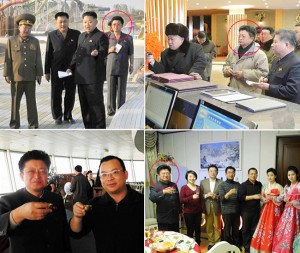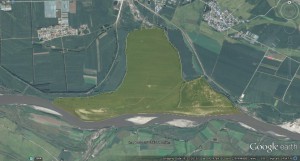Following Jang’s purge, there has been speculation about what exactly will happen to economic relations between China and the DPRK and with ongoing efforts to introduce economic reform measures in the DPRK. According to the People’s Daily (China):
The execution of the uncle of Pyongyang’s top leader may temporarily affect some cooperation projects with China, but economic ties between the neighbors will remain stable in the long run, analysts say.
The Democratic People’s Republic of Korea’s official news agency KCNA reported on Friday that Jang Song-thaek, uncle of supreme leader Kim Jong-un, was executed on Thursday for being a traitor.
Jang was in charge of economic affairs and cooperation with China.
“Following Jang’s execution, the DPRK is likely to review cooperation projects with China,” said Gao Haorong, an expert on DPRK studies at the Xinhua Center for World Affairs Studies, a think tank under Xinhua News Agency.
Jang led delegations to China for negotiations on economic projects, including Hwanggumpyong Island, a special economic zone near Dandong in Liaoning province.
Chen Qi, a professor in international affairs at Tsinghua University, said that after Jang’s execution, China and the DPRK may need some time to rebuild connections to continue cooperation on such projects and to further their economic cooperation.
But Wang Junsheng, a researcher in East Asian studies at the Chinese Academy of Social Sciences, said the impact will be short-term and limited.
“Pyongyang needs China to support its economic development, and this offers opportunities for Chinese companies, so both sides want to advance ties,” Wang said.
“Both countries have the will to consolidate their relations, given frequent high-level visits,” he said.
The latest such exchange saw Chinese Assistant Foreign Minister Zhang Kunsheng meet a visiting delegate from the DPRK’s Foreign Ministry on Friday.
At a news briefing on Friday, Chinese Foreign Ministry spokesman Hong Lei said China hopes and believes that economic relations between the two countries will continue to advance.
Hong said it is in line with the interests of both to develop economic ties. China will further promote economic cooperation with the DPRK.
He described Jang’s execution as “an internal affair” of the DPRK.
In response, the DPRK has started sending signals that Jang’s purge will not lead to any surprises. Eric Talmadge writes for the Associated Press:
The execution Friday of Jang, considered to be North Korea’s second most powerful man and a key architect of the country’s economic policies, should not be taken as a sign that the North will change its economic course or its efforts to lure foreign investment, Yun Yong Sok, a senior official in the State Economic Development Committee, said in an interview with The Associated Press in Pyongyang.
…
“Even though Jang Song Thaek’s group caused great harm to our economy, there will be no change at all in the economic policy of the Democratic People’s Republic of Korea,” Yun said. “It’s just the same as before.”
Jang’s sudden purge and execution for allegedly trying to overthrow the government has raised questions about how solid the North Korean regime is and whether it will be able to stay the course on policies aimed at raising the country’s standard of living.
…
The North has shown no willingness to abandon its nuclear weapons program to get out from under international trade sanctions. That makes investment or financing from major international organizations difficult if not impossible.
It also means the success of the zones hinges on China, North Korea’s only major ally, and Jang was seen as a crucial conduit between Pyongyang and Beijing, along with being a supporter of China-backed reforms, such as the zones, to revive the North’s moribund economy.
Jang met with top Chinese officials during their visits to Pyongyang, and in 2012 traveled to China as the head of one of the largest North Korean delegations ever to visit the Chinese capital to discuss construction of the special economic zones, which Beijing hopes will ensure North Korea’s stability.
Yun, however, downplayed Jang’s importance in policymaking and said his removal would instead speed progress on the economic front because he was a threat to the unity of the nation. He said Jang’s execution should not scare away Chinese investment, which is crucial to the success of the zones.
“By eliminating the Jang Song Thaek group, the unity and solidarity of our party and people with our respected marshal at the center has become much stronger, our party has become more determined and the will of our soldiers and people to build a prosperous socialist country has been strengthened,” Yun said. “Our State Economic Development Committee welcomes investment and business from any country to take part in the work of developing our new economic zones.”
Yun said local officials have been tasked with drawing up the plans for the zones in their jurisdictions and are likely to formally submit them for approval to his commission within the next few months.
At the same time, rumors from the South Korean media indicate that North Korean businessmen in China are returning home in large numbers. According to Yonhap (2013-12-14):
North Korean businessmen in China have been summoned back to their country in large numbers in connection with the execution of North Korea’s No. 2 man two days ago, sources familiar with the issue said Saturday.
The businessmen worked out of the northeastern Chinese cities of Shenyang and Dandong to facilitate trade between the two countries and attract Chinese investment in North Korea, according to the sources.
The top North Korean official in charge of promoting economic ties with China is believed to have been Jang Song-thaek, the once-powerful uncle of North Korean leader Kim Jong-un.
With Jang’s execution on Thursday, however, North Korea appears to be cracking down on those loyal to him by summoning them back to their country, the sources said.
Jang was executed immediately after a special military tribunal found him guilty of treason, according to the North’s state media.
“Large numbers of North Korean businessmen in Shenyang and Dandong have gone home in a hurry this week,” said one source, who declined to be identified.
“Judging from their numbers and the fact that it was so sudden, it doesn’t appear to be related to the second anniversary of (the death of former North Korean leader) Kim Jong-il on Dec. 17,” the source said, referring to the late father of the current leader.
According to another source, Norea Korea plans to summon all of its officials and staff from China in stages.
“The ostensible reason will be to educate them on the government’s policies, but (in fact), those classified as having connections to Jang Song-thaek will never be able to go abroad again and will be purged,” the source said, also requesting anonymity.
On Chinese report insinuated that Jang’s ouster could affect Chinese investment in the Hyesan Youth Copper Mine. According to Shanghai Metals Market:
North Korea’s Zhang Chengze [Jang Song-thaek] event might undermine Wanxiang Group’s 500-million-yuan ($81.6 million) investment in Huishan copper mine [Hyesan Youth Copper Mine], according to a report by the business magazine China Entrepreneur.
Back in 2004, Wanxiang Group’s chairman Lu Guanqiu started investing in Huishan copper mine with a joint venture company Sino-Mining International Investment Co. and added up total investments to 560 million yuan over the years, according to the report.
The mine, said to have a copper reserve largest in Asia and located just 10 kilometers from the China-North Korea border, was put into production in 2011. Yet daily operations met with many political hurdles since, the report said.
Zhang Chengze, North Korea’s young leader Kim Jeong-eun’s uncle and close aid with a pro-China view, was executed by Kim earlier this month.
Both the Rason and Hwanggumphyong Special Economic Zones have been brought to a standstill following Jang’s purge. Leaders from both projects have been called back to Pyongyang.
You can read posts related to Jang’s purge here.
Click to read posts on the Economic Development Zones and the new Law on Economic Development Zones.
Read the full story here:
N Korean Official: Purge Won’t Hurt Economic Policy
Associated Press
Eric Talmadge
2013-12-15


